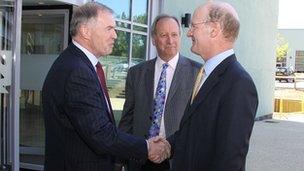Civil servant tax claims: Danny Alexander orders review
- Published
Student Loans Company's chief executive paid without tax deductions
A review of the tax affairs of top civil servants has been ordered by the chief secretary to the Treasury.
Danny Alexander's move comes after BBC Newsnight found that the Student Loans Company's chief executive received his £182,000 pay package without deductions for tax or National Insurance.
The arrangement was agreed by the tax authorities and potentially saved Ed Lester tens of thousands of pounds.
The SLC said it had "followed all government guidelines" on remuneration.
A Freedom of Information request by journalist David Hencke of Exaro News, external revealed documents which showed that chief executive Ed Lester's salary package was paid gross to his private service company.
A Treasury spokesman said that Mr Alexander was "not made aware" of the potential tax benefits to Mr Lester when he approved his appointment and salary levels, and had now ordered an "urgent review" into the "appropriateness" of civil servants being paid through an agency or private service company.
Richard Bacon MP, who sits on the House of Commons Public Accounts Committee, described the figures that Newsnight had uncovered as "outrageous".
"I've only come across this kind of thing twice before and on those occasions we forced the consultant CEO to go on the books. We can't have one rule for those with tax advice and another for everyone else."
The structure of Mr Lester's pay dates back to his original contract when he was appointed interim chief executive in May 2010 following months of chaos at the SLC.
Thousands of students in England were left without grants or loans in autumn 2009 after administration problems.
Mr Lester was recruited through the specialist recruitment agency Penna plc, and requested the daily fee for his work as a consultant of £900 to be paid without tax or National Insurance contributions (NIC) deducted.
Such a package was only possible with a special concession from HM Revenue and Customs, which was duly sought and agreed.

Ed Lester's appointment was approved by Universities Minister David Willetts
In January 2011, Mr Lester was given the job of chief executive on a two-year contract, but retained the terms of his temporary employment, instead of being added to the payroll, an arrangement that officials at the SLC and the Department for Business, Innovation and Skills knew would reduce the tax he paid.
Before his employment was finalised, the terms of his remuneration were brought to the attention of Universities Minister David Willetts and Cabinet Secretary Sir Gus O'Donnell, who sought clarification about the cost of employing Mr Lester, and the tax arrangements, before approving his appointment.
In emails seen by the BBC, SLC officials argued that over the two-year contract, employing Mr Lester through his personal company via Penna would cost less than adding him to the payroll.
They produced figures which showed that Mr Lester's package of salary, bonus, pension contribution, travel expenses - which include a weekly commute from his home in Buckinghamshire to SLC offices in Glasgow - and agency fees would cost £501,000 over the two years with the existing arrangement.
But if he was moved onto payroll, the total for two years would reach £588,900 because of a finder's fee payable to Penna and tax and National Insurance costs to the SLC.

Mr Lester's private service company is registered to his home address on the River Thames near Marlow
Responding to the investigation by Newsnight, the SLC said it had followed all government guidelines on the appointment and remuneration of the chief executive, and that his two-year contract had cost less than the interim agreement on which Mr Lester was originally appointed.
Margaret Hodge MP, chairwoman of the Commons Public Accounts Committee, told Newsnight that she would be investigating the case.
"Civil servants must be seen to be paying their fair share of tax in an open and transparent way. If the allegations you've brought to me are true, then we will want to ask some questions of the department's permanent secretary and the cabinet secretary about why they signed off this deal."
Mr Lester's private service company's published accounts do not reveal any detail of how much he is ultimately paying in tax or NICs.